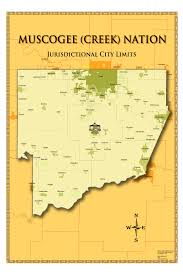
Thursday’s U.S. Supreme Court ruling overturning a Denver Federal Appeals court decision that had upheld a state criminal prosecution on Indian land in eastern Oklahoma evoked responses from the state attorney general, the state’s congressional delegation and even Oklahoma’s largest oil and gas group. It also leaves the state of criminal prosecution in certain areas of the state in question.
The high court, in a 5-4 ruling said much of eastern Oklahoma falls within an Indian reservation—a decision that legal observers suggest might force a reshaping of the criminal justice system and possibly prevent state authorities from prosecuting criminal offenses involving Native Americans.
The ruling came in an appeal by Jimcy McGirt, a member of the Muscogee (Creek) Nation who had been convicted of sex crimes against a child, a crime that McGirt argued should have resulted in federal prosecution because it took place in the Nation’s historical boundaries.
He argued Congress had never dissolved the sovereignty of the Creek Nation over eastern Oklahoma and the Supreme Court agreed.
Tribal leaders hailed it as a hard-fought victory.
“This is a historic day,” Principal Chief David Hill said in an interview. “This is amazing. It’s never too late to make things right.”
While reaction among some was to quickly point to the age-old claim of “broken treaties,” others immediately vowed to work with the tribes to settle any legal issues.
From an energy point of view, Petroleum Alliance of Oklahoma President Brook A. Simmons expressed disappointment, “but we are moving forward to work with the state of Oklahoma, the tribes and Oklahoma’s Congressional delegation to ensure that our members continue to have a stable, predictable regulatory and tax environment consistent with their interests.”
Simmons said. “It is critical for continued investment in Oklahoma that the state maintain primacy with regard to the regulation of oil and gas operations, and that issues of title with regard to real property remain unaffected.”

Oklahoma Attorney General Mike Hunter joined with the Muscogee (Creek), Cherokee, Chickasaw, Choctaw and Seminole Nations in issuing a statement that they “have made substantial progress toward an agreement to present to Congress” addressing and resolving significant jurisdictional issues.
All said they are committed to making sure that McGirt and other offenders face justice for their accused crimes.
The state’s members of the U.S. House also said much the same, adding they “stand ready to work with both tribal and state officials to ensure stability and consistency in applying law that brings all criminals to justice.”
U.S. Senators James Lankford and Jim Inhofe said the ruling clarifies that the Creek Nation’s reservation was never dis-established when Oklahoma became a state.
“I am grateful for the commitment from the state and the 5 Tribes to work with the delegation to craft legislation that ensures that the ruling has a minimal impact on individuals and businesses throughout Oklahoma,” stated Lankford.
“As we move forward, I have no doubt we can work together with state officials, tribal organizations, and the delegation to find a workable solution for everyone that ensures criminals are prosecuted and brought to justice in the most appropriate manner,” said Sen. Inhofe. “We have a duty to all American citizens to uphold the Constitution and stand up for victim’s rights.”
But the New York Times reported that Chief Justice John G. Roberts warned in a dissenting opinion that the Court had sown confusion in the state’s criminal justice system and “profoundly destabilized” the state’s powers in eastern Oklahoma.
“The State’s ability to prosecute serious crimes will be hobbled and decades of past convictions could well be thrown out,” Justice Roberts wrote. “The decision today creates significant uncertainty for the State’s continuing authority over any area that touches Indian affairs, ranging from zoning and taxation to family and environmental law.”





